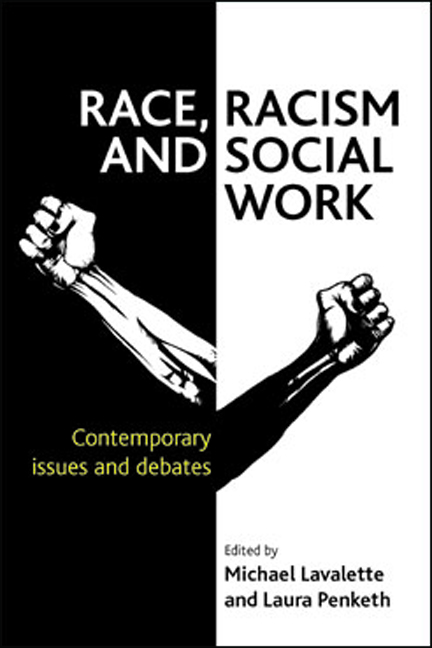Book contents
- Frontmatter
- Contents
- Notes on contributors
- Acknowledgements
- Dedication
- Some terms and definitions
- Introduction: Race, racism and social work
- one Rethinking anti-racist social work in a neoliberal age
- two The growth of xeno-racism and Islamophobia in Britain
- three The catalysers: ‘black’ professionals and the anti-racist movement
- four “Same, same, but different”
- five Antisemitism and anti-racist social work
- six Anti-Roma racism in Europe: past and recent perspectives
- seven In defence of multiculturalism?
- eight Social work and Islamophobia: identity formation among second and third generation Muslim women in north-west England
- nine Institutionalised Islamophobia and the ‘Prevent’ agenda: ‘winning hearts and minds’ or welfare as surveillance and control?
- ten ‘Street-grooming’, sexual abuse and Islamophobia: an anatomy of the Rochdale abuse scandal
- eleven My people?
- twelve Twenty-first century eugenics? A case study about the Merton Test
- thirteen The role of immigration policies in the exploitation of migrant care workers: an ethnographic exploration
- Conclusion: Race, racism and social work today: some concluding thoughts
- Bibliography
- Index
nine - Institutionalised Islamophobia and the ‘Prevent’ agenda: ‘winning hearts and minds’ or welfare as surveillance and control?
Published online by Cambridge University Press: 01 February 2022
- Frontmatter
- Contents
- Notes on contributors
- Acknowledgements
- Dedication
- Some terms and definitions
- Introduction: Race, racism and social work
- one Rethinking anti-racist social work in a neoliberal age
- two The growth of xeno-racism and Islamophobia in Britain
- three The catalysers: ‘black’ professionals and the anti-racist movement
- four “Same, same, but different”
- five Antisemitism and anti-racist social work
- six Anti-Roma racism in Europe: past and recent perspectives
- seven In defence of multiculturalism?
- eight Social work and Islamophobia: identity formation among second and third generation Muslim women in north-west England
- nine Institutionalised Islamophobia and the ‘Prevent’ agenda: ‘winning hearts and minds’ or welfare as surveillance and control?
- ten ‘Street-grooming’, sexual abuse and Islamophobia: an anatomy of the Rochdale abuse scandal
- eleven My people?
- twelve Twenty-first century eugenics? A case study about the Merton Test
- thirteen The role of immigration policies in the exploitation of migrant care workers: an ethnographic exploration
- Conclusion: Race, racism and social work today: some concluding thoughts
- Bibliography
- Index
Summary
In this chapter Lavalette looks at the ‘Prevent’ policy agenda. This policy was rolled out in the aftermath of the 7/7 bombings in London. It was an amalgam of internal security policy, social inclusion policy and a political strategy to ‘win hearts and minds’. Yet it was built upon a series of worrying assumptions about Muslim communities and ill-defined definitions of ‘extremism’. Teachers, probation staff and social workers were all tasked with ‘soft’ policing the policy agenda – raising issues for social workers around the Professional Capabilities Framework domain 2 (working in ways that are reflective of our values and ethics). With the election of the Conservative–Liberal Democrat coalition in 2010 the policy was redirected and its connection with ‘social inclusion’ dropped. It remains a policy framework that is ‘mainstreamed’ within a range of local authority measures but its rationale and its assumptions remain deeply controversial. In the aftermath of the Woolwich murder in London in May 2013 Prime Minister David Cameron, London Mayor Boris Johnson and Home Secretary Teresa May all made reference to the need to monitor and control Muslim communities and Muslim students on university campuses in a bid to stop young men (mainly) from becoming ‘radicalised’. In this context ‘Prevent’ is being identified, once more, as a central government policy driver.
Preventing violent extremism in the name of Islam must, first and foremost, be about winning the struggle for hearts and minds. (Department of Communities and Local Government [CLG] 2007b: 5)
Introduction
In the aftermath of the 7/7 Bombings in London the, then Labour, Government beefed up its counter-terror strategy called CONTEST (which is always written in block capitals), central to which was ‘Prevent’: a mechanism to engage with Muslim communities and to win ‘hearts and minds’, particularly the ‘hearts and minds’ of young Muslims who are susceptible to ‘Islamic extremism’ (Department of Communities and Local Government [DCLG] 2007a). As Hazel Blears (at the time Minister of State for DCLG) said in February 2009, ‘[It's not] because we think Muslims are violent extremists but instead it is because we know the violent extremists prey upon Muslims and especially young people’ (Blears 2009).
- Type
- Chapter
- Information
- Race, Racism and Social WorkContemporary Issues and Debates, pp. 167 - 190Publisher: Bristol University PressPrint publication year: 2013
- 1
- Cited by



